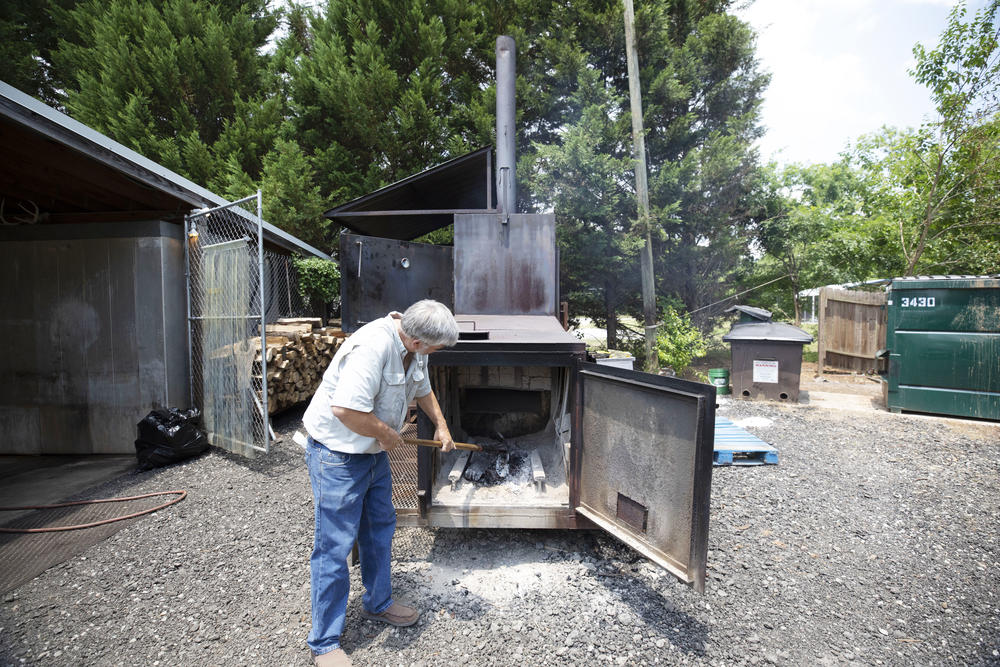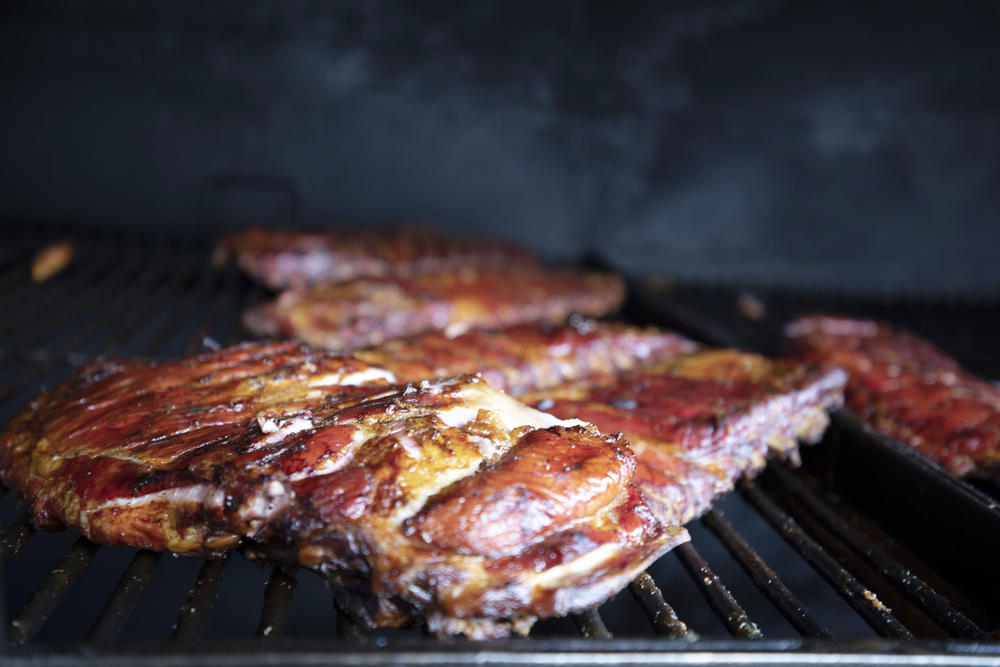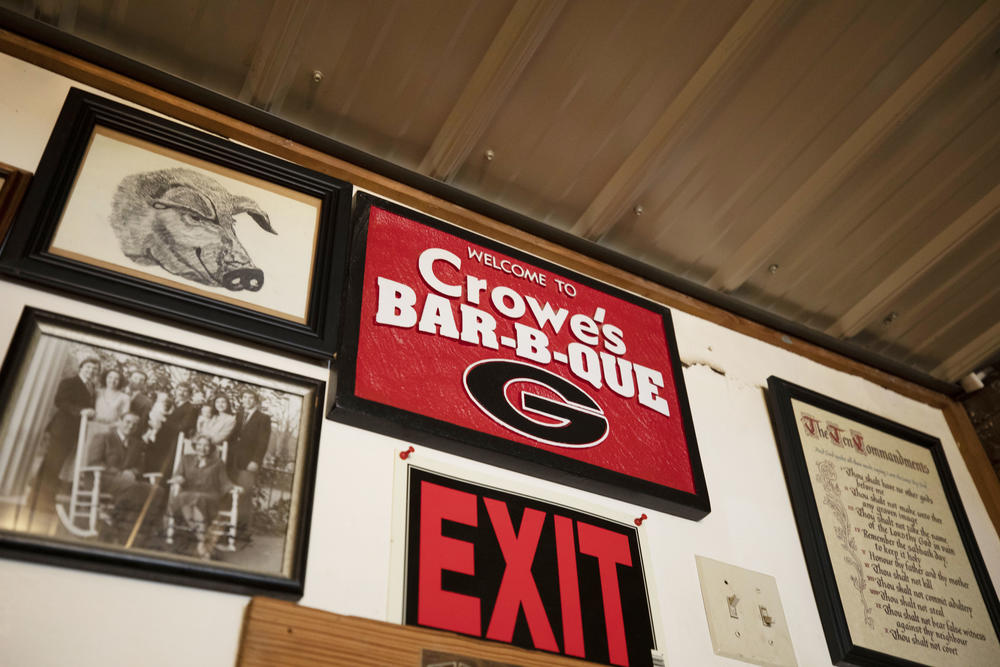Section Branding
Header Content
Georgia Barbecue Trail Traces Path Of People, Too
Primary Content
Craig Pascoe says when people come to Georgia, North Carolina or Alabama they often have one food on their mind.
“The first thing they ask is ‘I want authentic BARBECUE,’” Pascoe said.
To satisfy aficionados’ appetite for Georgia barbecue, Pascoe teamed up with colleague James “Trae” Welborn to develop Georgia Barbecue Trails, a website mapping the location of traditional barbecue restaurants and situating their stories in the history and culture of Georgia.Georgia Barbecue Trail Traces Path Of People, Too
“We want to provide a place where people can come and learn about barbecue and the depth that barbecue has and the importance of barbecue in the history and culture of the state,” Pascoe said.
Pascoe and Welborn are professors of Southern history at Georgia College in Milledgeville. They see barbecue as an appetizer for a larger conversation about a broad range of themes and issues in Southern history.
“Barbecue really brings together all the different elements that make up historical development,” Welborn said. “You have economic shifts, you have race relations, you have class dynamics — as you explore barbecue, you really explore the history of the state, the history of particular families, particular communities and, more broadly, the state within the nation and across the globe.”
Barbecue may be a sure-fire conversation starter for classroom discussion, but Pascoe and Welborn knew interest in the topic won’t be limited to students. They created georgiabbqtrails.com as a website where viewers can learn about the state’s history through barbecue and make a little history of their own by blazing their own barbecue trail on Georgia’s many highways and byways.
“If they’re coming down 85, or going up 75 coming in from Florida, they can see where the barbecue places are within about 15 to 20 miles from those major interstates – 20, 16, 75 or 85,” Pascoe said.
“We Weren’t Trying To Reinvent The Wheel; We’re Just Trying To Keep It Consistent.”
One stop on any Georgia Barbecue Trail should be Crowe’s Bar-B-Que.
Located just north of the intersection of I-20 and Highway 441 in Madison, Crowe’s is a second-generation family owned business whose barbecue goes back a lot further.
“My granddaddy had a dairy in DeKalb County. And every year at the Fourth of July they would have a customer appreciation and they would feed, back then — this was in the '60s – they’d feed 400-500 folks, which DeKalb County back then was rural,” said Phillip Crowe, who founded Crowe’s Bar-B-Que in 1991.
Sixty years ago, Phillip’s grandfather L.J. Crowe would stay up all night cooking whole hogs, goat and pots of Brunswick Stew. But his specialty was ribs.
“He could take ribs and cook slow with the coals like he did,” Phillip said. “When you cook them slow for three or four hours and they’re barely dripping, it’s just — everybody loved ‘em.”
In 1976, Phillip’s father, Bobby, incorporated Granddaddy L.J.’s love of barbecue into a little country grocery store in the Centerville community of Gwinnett County. Bobby Crowe began putting family recipes on paper and engineering a distinct means of cooking the Crowe family barbecue.
“We’ve Got Several Cookers We Built Over The Years We Didn’t Like And They’re Not Here No More.”
“The first [cooker] we built was in ’76, we built it out of concrete,” Phillip Crowe said. “My daddy’s cousin had a contract with Georgia Power and Bell South pouring these underground boxes and they modified [one], set one on the bottom and set [another] one up on top, we put doors and the racks in it, laid a chimney and built a barn around it. He had a country store, and that’s where I really learned how to finally started cooking barbecue.”
Crowe’s current cooker resembles a boxy, black-metal steam engine with a front-loading fire box leading up to a large chamber capable of cooking hundreds of pounds of ham and chicken and numerous racks of ribs. Custom built in 1994, this convection-based, single pass cooker has seen several modifications over its 25 years, but one secret to its longevity was built in from the beginning.
“When we built this one, everybody said ‘that’s way too much chimney,’ and I said ‘well I don’t think you can have too much chimney,’” Phillip Crowe says pointing to the metal smoke stack rising 25 feet from the back of the cooker. “You can put all the air you want into it, but if it don’t draw, it will make your meat get a heavy darkness, too much hickory flavor.”
As Phillip Crowe shows off the operation and recounts the Crowe’s family history in barbecue, the next generation buzzes around him throwing wood on the fire, flipping meat and moving cooked food from the cooker to the kitchen.
Phillip’s son Ben Crowe now runs the restaurant’s day-to-day operations. The restaurant in Madison opened when he was less than a year old, so he’s come of age as his father transitioned family tradition into a recipe for success.
When asked about how he decides how much meat to cook on any given business day or how he knows when to add a piece of hickory, white oak or pecan wood to the fire, he said there’s no formula or prescribed way of doing things. It comes down to the feel he has for the work.
“It’s based off of experience,” he said. “I’ve been doing it with my father since I was 12 or 13 years old, actually standing up here on the pit with him.”
And the knowledge hasn’t only moved in one direction. Along with business partner Mason Carter, Ben is helping his father connect the Crowe’s family restaurant with a new audience that wants their barbecue with a side of tradition. He’s adapting Crowe’s mainstays into new menu items like smoked chicken salad and using Instagram and Facebook to invite customers old and new to eat at Crowe’s. The next big thing is a food truck to help bring Crowe’s Bar-B-Que to the masses.
“At Crowe’s, I Tasted History.”
Professors Pascoe and Welborn say Crowe’s Bar-B-Que is indicative of the way they’re seeing Southern traditions of barbecue evolve and adapt over time. Beginning with L.J Crowe’s celebration of community and appreciation, each generation has added its own flavor or technique to the recipe, resulting in a meal that tells a story about the Crowe’s and their history in Georgia.
“I think Crowe’s has a lot of the elements in terms of those major patterns that we’ve started to see,” Welborn says. “Not only the way they’ve made they’re barbecue low and slow over wood, but the way they’ve honed those skills over multiple generations, migrated from different places and tried to keep those traditions alive.”
You can learn more about Georgia history and its barbecue traditions at georgiabbqtrails.com.



